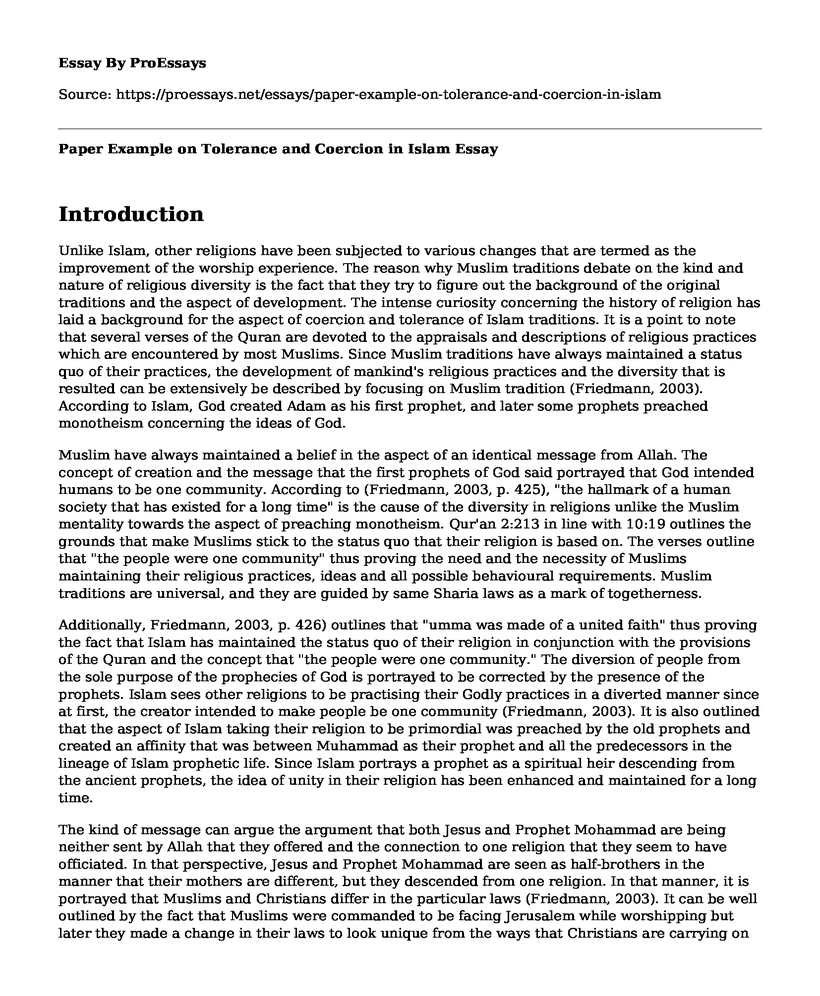Introduction
Unlike Islam, other religions have been subjected to various changes that are termed as the improvement of the worship experience. The reason why Muslim traditions debate on the kind and nature of religious diversity is the fact that they try to figure out the background of the original traditions and the aspect of development. The intense curiosity concerning the history of religion has laid a background for the aspect of coercion and tolerance of Islam traditions. It is a point to note that several verses of the Quran are devoted to the appraisals and descriptions of religious practices which are encountered by most Muslims. Since Muslim traditions have always maintained a status quo of their practices, the development of mankind's religious practices and the diversity that is resulted can be extensively be described by focusing on Muslim tradition (Friedmann, 2003). According to Islam, God created Adam as his first prophet, and later some prophets preached monotheism concerning the ideas of God.
Muslim have always maintained a belief in the aspect of an identical message from Allah. The concept of creation and the message that the first prophets of God said portrayed that God intended humans to be one community. According to (Friedmann, 2003, p. 425), "the hallmark of a human society that has existed for a long time" is the cause of the diversity in religions unlike the Muslim mentality towards the aspect of preaching monotheism. Qur'an 2:213 in line with 10:19 outlines the grounds that make Muslims stick to the status quo that their religion is based on. The verses outline that "the people were one community" thus proving the need and the necessity of Muslims maintaining their religious practices, ideas and all possible behavioural requirements. Muslim traditions are universal, and they are guided by same Sharia laws as a mark of togetherness.
Additionally, Friedmann, 2003, p. 426) outlines that "umma was made of a united faith" thus proving the fact that Islam has maintained the status quo of their religion in conjunction with the provisions of the Quran and the concept that "the people were one community." The diversion of people from the sole purpose of the prophecies of God is portrayed to be corrected by the presence of the prophets. Islam sees other religions to be practising their Godly practices in a diverted manner since at first, the creator intended to make people be one community (Friedmann, 2003). It is also outlined that the aspect of Islam taking their religion to be primordial was preached by the old prophets and created an affinity that was between Muhammad as their prophet and all the predecessors in the lineage of Islam prophetic life. Since Islam portrays a prophet as a spiritual heir descending from the ancient prophets, the idea of unity in their religion has been enhanced and maintained for a long time.
The kind of message can argue the argument that both Jesus and Prophet Mohammad are being neither sent by Allah that they offered and the connection to one religion that they seem to have officiated. In that perspective, Jesus and Prophet Mohammad are seen as half-brothers in the manner that their mothers are different, but they descended from one religion. In that manner, it is portrayed that Muslims and Christians differ in the particular laws (Friedmann, 2003). It can be well outlined by the fact that Muslims were commanded to be facing Jerusalem while worshipping but later they made a change in their laws to look unique from the ways that Christians are carrying on their worship by facing Mecca. However, Islam maintained their religious practices later as a way of enhancing their loyalty to Prophet Mohammad who they claim is a messenger from Allah. Religious practices have been changing due to humans becoming affiliated by social changes without considering the primary aim of God and Allah concerning the concept of unity as a human community.
Conclusion
The religious history of mankind has been predominantly being defined and altered by traditional beliefs and the changing aspect of the unity of communities. A great deal of religious unity and the stages of human history have however subjected a small impact on the Islamic religion, unlike the Jewish based religions. It has been however being found out that Islam incorporated an abundant of Judeo-Christian beliefs and traditions that brought to a slight change in the religious practices portrayed in the Islam beliefs and practices (Friedmann, 2003). The aspect of Mohammad prophesies seems to be the same concepts that were revealed by Musa and Nuh concerning the promises that God outlined to Ibrahim. In the wider perspective, Islam belief is a connection of Judeo-Christian beliefs with a few adjustments concerning the belief that Islam has concerning Allah. It is argued that the disparities portrayed by religions are justifiable with the idea that God did not reveal the same concepts and information to all prophets. Since each prophet was given particular information to pass to people, there is the possibility that religions serve one God who gave different prophetic messages to different prophets to offer to people who were once one community.
References
Friedmann, Y. (2003). Tolerance and Coercion in Islam: interfaith relations in the Muslim tradition. Cambridge University Press.
Cite this page
Paper Example on Tolerance and Coercion in Islam. (2022, Aug 08). Retrieved from https://proessays.net/essays/paper-example-on-tolerance-and-coercion-in-islam
If you are the original author of this essay and no longer wish to have it published on the ProEssays website, please click below to request its removal:
- Understanding the Phenomenon of Islamic Charity in the Islamic World and Beyond
- Essay Sample on Islamic Art
- Essay on Afterlife in Christianity and Hinduism
- Spirituality and Ethics of Human Cloning Essay Example
- Christian Nature of Spirituality Essay Example
- Overview of the Life of Buddha Essay
- God's Unconditional Love: Marriage & Homosexuality in Christian Perspective - Essay Sample







